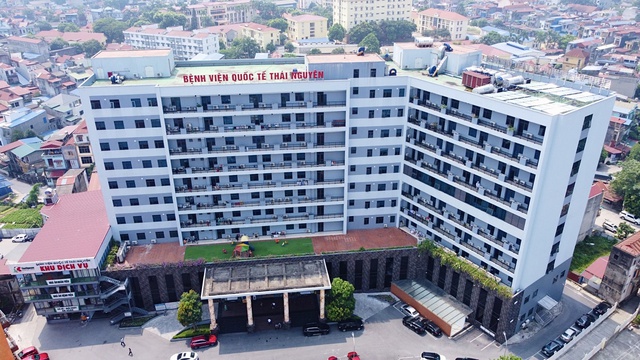Competition of private hospitals raises the quality of the medical industry
According to the Ministry of Health, there are currently 304 private hospitals in the country. This is a much smaller number compared to over 1,000 large-scale public hospitals nationwide. According to Mr. Nguyen Van De, Chairman of the Private Hospitals Association, there are currently outstanding private hospitals that are trusted by people to choose for medical examinations, treatments, and disease management. In the past, many people went abroad for medical treatment, but now patients want to stay to receive medical treatment in the country. The competition of private hospitals has prompted many public hospitals to upgrade in terms of quality, personnel, and infrastructure.
Mr. Nguyen Trong Khoa, Deputy Director of the Department of Medical Examination and Treatment Management under the Ministry of Health, said that currently private hospitals only account for 5% of the total number of hospital beds. To achieve the goal of 15% by 2025, the private healthcare system needs to develop and attract large-scale investments from various organizations.
Being considered one of the largest investors in healthcare in the northern region of Vietnam, immediately after Lunar New Year, Thai Nguyen International Hospital Joint Stock Company (TNH) announced a large-scale recruitment to prepare for the operation of the 300-bed TNH Viet Yen Hospital. At the end of this month, TNH Lang Son Hospital, with a total investment of 700 billion VND, will start construction. It is expected that TNH Hanoi will commence construction in 2024 with an investment of 2,500 billion VND and 500 hospital beds.

According to Mr. Hoang Tuyen, Chairman of TNH’s Board of Directors, the public healthcare system is overloaded, resulting in long wait times. Therefore, developing the private sector is the right direction and an inevitable trend to supplement healthcare facilities, providing people with more options for healthcare services.
Well-managed private hospitals with adequate facilities have brought convenience to patients, especially reducing the burden on public hospitals and higher-tier hospitals. Nowadays, in some provinces and cities, patients no longer have to make the effort to go to Hanoi or Ho Chi Minh City, and their families don’t have to wait for medical treatment. If customers have a demand, the hospital will invite professors and top doctors from central hospitals to perform surgeries, examinations, etc., bringing many benefits to patients in terms of transportation, care conditions, and expenses.
The Ministry of Health has statistics showing that Vietnamese people spend about 2 billion USD per year on medical treatment abroad. When large investments are made by private hospitals in specialized healthcare systems with high-quality human resources, it is expected that this foreign currency drain will be reduced.
Strong private healthcare investment in terms of facilities and personnel, according to Mr. Khoa’s evaluation, is the right direction. Policies will be developed towards equal treatment of healthcare facilities and encouraging investment in private healthcare. “In ASEAN, only Vietnam has a policy that allows 100% foreign capital investment in hospitals and clinics,” Mr. Khoa said.
Challenges in healthcare investment
Investing in healthcare presents numerous challenges. It has a prolonged payback period and directly impacts people’s health, so it is not simple. There is a difficulty in having high-quality and specialized human resources as the training of doctors and nurses takes a long time.
According to Mr. De, in reality, there have been quite a few private hospitals established with the purpose of rapid capital recovery, focusing on profits. Only aiming at short-term benefits has made these hospitals only able to operate for a short period of time and be boycotted by patients. Therefore, successful hospitals all have long-term goals as their strategic focus, prioritizing the quality of patient care and services, and investing in human resources.
Mr. Hoang Tuyen said that in addition to a competitive salary and social welfare to attract excellent doctors, TNH focuses on recruitment, scholarships, and training expenses for young doctors even while they are still in medical school, and sends them for training both domestically and abroad after joining TNH
Thanks to this personnel strategy, from a small-scale healthcare facility with 150 beds initially, TNH has now developed two hospitals in Thai Nguyen and one hospital in Bac Giang, with a total of 850 beds and more than 1,300 medical services.
When well-managed, private hospitals continue to develop. The competition and interaction between the public healthcare system and private healthcare will be fierce. This reality forces public healthcare facilities to change their management methods, improve quality, and service spirit. Otherwise, private healthcare will surpass not only in attracting patients but also in attracting human resources.
To achieve the goals of Resolution 20/NQ-TW, striving for the private healthcare bed-to-population ratio to reach 3 times the current ratio by 2025, experts believe that the State needs to support land, tax policy, and banking interest rates to promote investment in private healthcare. Private hospitals must be fully autonomous, which means the initial investment costs are huge. Creating mechanisms that help this area develop sustainably is equivalent to bringing great community value and helping people have more reassurance and better healthcare options.




































